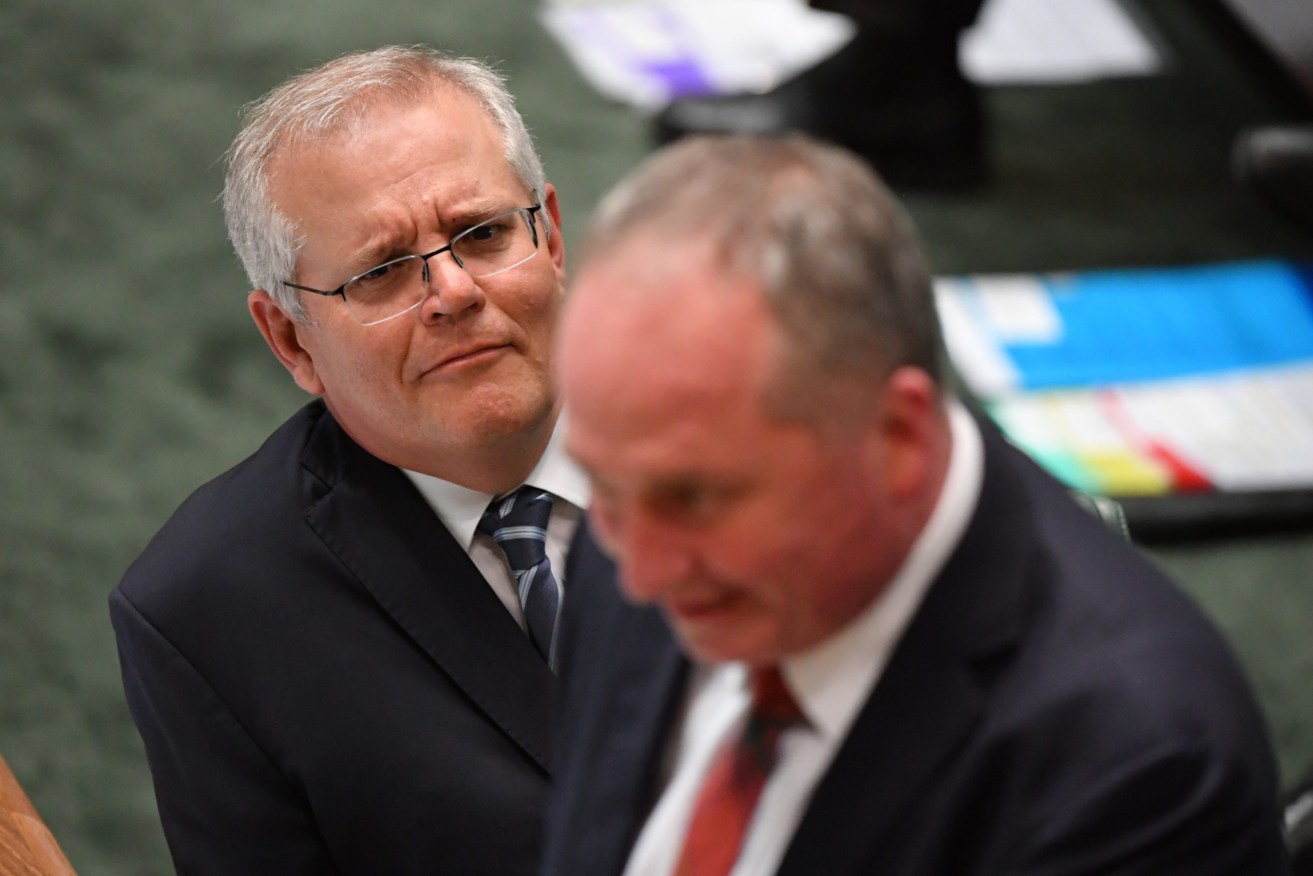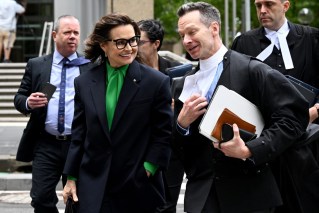Barnaby’s net zero ‘ransom note’ outrageous – not just because of pork barrelling
The National party’s eleventh hour deal to support net zero emisssions by 2050 highlights the Morrison Government’s lack of planning for a “just transition” writes Robert MacDonald


Scott Morrison and Barnaby Joyce during Question Time in the previous parliament. (AAP Image/Mick Tsikas)
The most outrageous thing about the Nationals’ ransom note to Prime Minister Scott Morrison detailing their price for supporting net zero emissions by 2050, isn’t the as-yet publicly unpriced pork barrelling.
That’s just politics simple and cynical. National MPs were only doing their job, using their momentarily powerful bargaining position to, successfully it seems, shake out billions of public dollars and guarantees of government service for their electorates.
It’s not even how long it’s taken us to reach this point, although, that too, is pretty outrageous.
We’ve known for years – regardless of anyone’s views on climate change – that the decarbonisation of the global economy will have vast economic ramifications, both good and bad, for Australia and its regions.
But it’s only now, just days before the United Nations Climate Change Conference in Glasgow, that the Morrison government is finally contemplating hard dollars and cents and extra support for potentially affected parts of the country.
And then only because their partners in the Coalition demanded it.
The really outrageous thing about this whole business is it shows just how lacking the Federal Government has been in terms of any coordinated strategy for handling the inevitable and enormous economic disruptions that will accompany decarbonisation.
This is despite the fact that six years ago, in 2015, then-Prime Minister Tony Abbott signed the Paris Agreement at the last UN Climate Change Conference.
The agreement, signed by 176 countries, included in its founding principles “the imperatives of a just transition of the workforce and the creation of decent work and quality jobs in accordance with nationally defined development priorities”.
A global “just transition” industry has blossomed since then.
The OECD has a Just Transition Centre, Scotland has a Just Transition Authority and South Africa is looking at one.
The European Commission recently formalised a AU$30 billion Just Transition Fund, “to ensure that the transition towards a climate-neutral economy happens in a fair way, leaving no one behind”.
The union movement nationally and internationally has also, naturally enough, embraced the idea.
In the meantime, in Australia, Tony Abbott declared in 2018 that he regretted signing the Paris Agreement, a view he reversed a year later after Scott Morrison rolled Malcolm Turnbull for the prime ministership and, in Abbott’s words, abandoned Australia’s “emissions obsession”.
But neither Turnbull, nor Morrison after him, chose to adopt a recommendation by a 2017 Senate inquiry into the future of coal-fired power stations to establish “an energy transition authority with sufficient powers and resources to plan and coordinate the transition in the energy sector, including a just transition for workers and communities”.
At the state level, the Queensland Government announced in 2018 it was establishing a “just transition group to provide a pathway from traditional to renewable energy generation, ensuring that the energy transition in Queensland is just and equitable for affected workers and communities”.
What has it achieved?
It’s hard to tell. I’ve read what I believe to be the relevant annual reports and can’t give you a precise answer.
The State Opposition has also periodically made enquiries in Parliament but with little result.
What we do know is that the group was established with a staff of five, headed by a manager on a salary of more than $200,00 a year, Lance McCallum, a former Electrical Trade Union official.
McCallum left the position last year to stand successfully as the Labor candidate for Bundamba.
The Government hasn’t filled the vacancy, as part of its “short-term response” to Treasurer Cameron Dick’s “saving and debt plan”, which among other things, includes not filling vacant, non-essential middle-management positions.
Managing a just transition might be important but it’s apparently not exactly essential.
And, in a move that would only make sense to experts in bureaucratic process, the just transition group has recently been rebadged as the “Emerging Industries Development Team”.
The new body’s brief seems to be more or less unchanged, that is to work “across government, industry, and the community to plan for and develop a future ready workforce for emerging and priority sectors”.
This has included “assessing emerging and growth industries in Queensland to inform future skills and training development priorities” and “establishing and supporting a stakeholder working group”.
It has also involved “continued engagement with energy stakeholders in their approach to engaging with workers and communities to plan for a lower carbon future”.
In other words, all the things government agencies do short of actual action.
But still, you’ve got to start somewhere and having some sort of considered approach to identifying and addressing the challenges ahead seems a logical starting point.
At worst, it’s a process that might better inform a party room full of self-interested MP’s thrashing out eleventh-hour deals to save their political hides.
At best it might actually result in a genuine “just transition”, rather than this weekend’s “just-in-time transition”.












